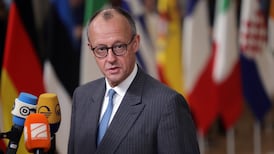The West must not recognise “sham” Belarusian elections on Sunday that will inevitably extend the 31-year rule of dictator Alexander Lukashenko, or sacrifice the country to Russia amid efforts to end the war in neighbouring Ukraine, its exiled pro-democracy leader has said.
Sviatlana Tsikhanouskaya was forced to flee Belarus five years ago after a presidential election that she and many western countries say she won, but which prompted a brutal crackdown by Lukashenko’s Russian-backed regime as he declared victory and arrested thousands of opposition protesters.
She told The Irish Times that Sunday’s election will be a mere “ritual” to continue Lukashenko’s control over a country where genuine opposition and independent media are banned and more than 1,250 political prisoners are behind bars, according to Belarusian human rights group Viasna.
“It’s critical for the world to understand that this is not a reflection of the Belarusian people’s will. It’s another tool of repression, designed to strengthen the dictatorship’s grip on power,” Tsikhanouskaya says of a ballot in which no critics of the regime are allowed to run.
READ MORE
“Western governments must reject this sham election and not legitimise the regime. Sanctions need to be stricter and more comprehensive,” she adds. “At the same time, it’s crucial to support Belarusian civil society and political prisoners. This is not a time for appeasement but for strategic action that isolates the regime while empowering democratic forces.”

Among Lukashenko’s prisoners is Tsikhanouskaya’s husband, Siarhei Tsikhanouski, a popular activist whom she replaced on the ballot paper for the 2020 presidential election when he was detained on politically motivated charges before being jailed for 18 years.
“My husband Siarhei has been incommunicado for two years already. My children write him letters, but we get no response. Not even lawyers are allowed to see him,” says Tsikhanouskaya (42), who also fears for other jailed opposition leaders such as Maria Kalesnikava and Viktar Babaryka and Nobel Peace Prize winner Ales Bialiatski.
“We’ve learned of deaths in prison due to horrific conditions. This is slow, deliberate torture,” she says.”Political prisoners are cut off from the world and denied basic medical care. They are marked for special harsh treatment in the prisons ... We need louder calls for their release, more pressure, and sanctions targeting those responsible for these crimes.”
Lukashenko (70) always kept a tight grip on power and stayed close to Russia, but occasionally eased pressure on his opponents and hinted that he might be open to closer relations with the West to reduce Kremlin influence over Belarus.
That ended with the election and massive demonstrations of 2020, which he survived by aligning himself entirely with Russian president Vladimir Putin and claiming that opposition to his regime was part of a western plot to topple him and weaken Moscow.
When Russia launched its all-out attack on Ukraine in 2022, Lukashenko allowed Russia’s ground forces to invade from Belarusian territory and let its warplanes use Belarus’s airbases and airspace to bombard its pro-western neighbour.
He said last month that Belarus now had dozens of Russian nuclear weapons and planned to host Moscow’s new intermediate-range ballistic missile, called Oreshnik, which Russia fired for the first time at Ukraine last November.
“Belarus has been subjected to a creeping occupation, as the dictator has sold our country to Putin in exchange for support to retain power, but Belarusians don’t want to be part of Russia and we are continuing our fight for freedom,” Tsikhanouskaya says.
European Union and Nato states also accuse Belarus of transferring large numbers of migrants from the Middle East and other regions to its western borders to cause security, social and political problems for Poland and the Baltic countries.
Lukashenko denies such allegations and claims to be a guarantor of stability for his country of nine million people: “Let them say that we have a dictatorship or something here,” he said this month. “Listen – better the kind of dictatorship that there is in Belarus than the kind of democracy there is in Ukraine.”

New US president Donald Trump has pledged to push Russia and Ukraine to end Europe’s biggest war in 80 years, and Tsikhanouskaya says any deal must favour Kyiv and must not hand Belarus to the Kremlin as a “consolation prize”.
“Peace in Ukraine is vital for Belarus, but it must be a just peace. A victorious Ukraine would weaken Putin, and a weakened Putin means a vulnerable Lukashenko,” she says. “I urge world leaders, including President Trump, to understand that a free Belarus is key to lasting security in Europe. Belarus cannot be left behind.”
At least for now, Lukashenko’s regime has crushed open opposition in Belarus, but Tsikhanouskaya is still inspired by the unprecedented rallies of 2020.
“Entire cities came alive with hope and determination. Women dressed in white, carrying flowers, standing together as a shield of peace – these moments of solidarity were unforgettable. Even under brutal repression, people found ways to show their defiance and love for freedom,” she says.
“It was a revolution of dignity and hope, and it showed the true spirit of Belarusians. Those days strengthened my belief that our people will achieve democracy and justice.”
- Sign up for push alerts and have the best news, analysis and comment delivered directly to your phone
- Find The Irish Times on WhatsApp and stay up to date
- Our In The News podcast is now published daily – Find the latest episode here




















